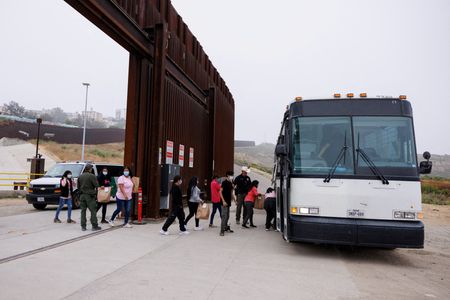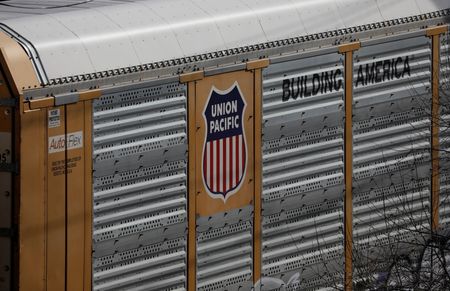By Ted Hesson, Mica Rosenberg and Kristina Cooke
WASHINGTON (Reuters) – U.S. President Joe Biden’s administration is blocking migrants from claiming asylum at the U.S.-Mexico border until attempted crossings fall under new actions rolled out last week.
WHAT DOES THE BIDEN ASYLUM BAN DO?
The new asylum ban allows authorities to quickly deport or send back to Mexico migrants who cross the U.S.-Mexico border illegally without the chance to claim asylum.
The ban took effect on Wednesday and remains in place because it is triggered when migrant arrests surpass 2,500 per day for a week. Daily average arrests per month have been above that level since January 2021, the month Biden took office.
The ban will stay in place until arrests drop below an average of 1,500 per day for one week, followed by a two-week waiting period.
The last month where migrant arrests fell below a daily average of 1,500 was in the early months of the COVID-19 pandemic in July 2020 when global travel was at historic lows.
IS THE BAN HAVING AN IMPACT?
U.S. Border Patrol arrested 3,100 migrants caught crossing illegally on Friday, a 20% drop compared with preceding days, a senior U.S. border official told Reuters over the weekend.
The official said the dropoff showed “possible early success” that the ban was deterring migrants but that the single-day snapshot did not prove a “definitive trend.”
The U.S. border official and others spoke on condition of anonymity to discuss internal government operations.
Border Patrol arrests held steady on Sunday at around 3,200, a second source familiar with the matter said.
Many factors could influence the volume of migrant crossings, including enforcement by Mexican authorities.
Questions still remain about whether border crossings will stay low enough to process people quickly and whether U.S. authorities have the capacity to meet their goals.
The American Civil Liberties Union said it intends to sue to stop the measure.
Migrants head through Mexico to the U.S. to escape violence, economic distress and negative impacts of climate change, according the United Nations.
WILL THESE MEASURES ‘CLOSE’ THE BORDER?
No. The restrictions apply to migrants crossing illegally, but access will not be blocked for people who seek an appointment to approach a legal border crossing through a government-run cell phone app called CBP One.
Others who have applied from abroad to enter through various humanitarian “parole” programs started by the Biden administration or temporary work visa holders will not be restricted.
The ban will also not apply to unaccompanied minors or people who face serious medical or safety threats and victims of trafficking, administration officials said.
Legal trade and travel across the U.S.-Mexico border will not be affected.
HOW WILL THIS WORK IN PRACTICE?
Key operational questions about how the asylum ban will play out over time remained unclear, including how the administration will quickly deport migrants from far-away and uncooperative countries and whether Mexico will accept more non-Mexican migrants under new enforcement regime.
The aim is to screen almost all migrants faster – possibly in under a week, a U.S. Department of Homeland Security official told Reuters. More migrant families could end up being held in tent facilities near the border while their deportation cases are being evaluated, the official said, calling the facilities “safe” but “extremely stressful” for families.
The official said families could be held in border facilities for several days and processed for deportation or potentially released depending on capacity.
Local officials and shelter directors in Tijuana, Mexico – across from San Diego, California – warned that migrants could get stuck in Mexico where there is limited capacity to house them safely.
WHY IS BIDEN DOING THIS NOW?
Biden has pushed unsuccessfully for months to pass a Senate bill that would toughen border security, including with a provision that resembles his latest moves by executive action. The bill was crafted by a bipartisan group of senators but Republicans rejected it after Trump came out in opposition.
Immigration is a key issue in the upcoming U.S. presidential elections in November when Biden will be facing Trump again in a rematch of the 2020 race. When it comes to immigration policy, registered voters prefer Trump over Biden by a 17 percentage point margin, according to a Reuters/Ipsos poll conducted in mid-May.
Border crossings have dropped in recent months, which the Biden administration credits in part to increased enforcement by Mexico. Still, Biden in his asylum ban proclamation said factors driving record migration remain and elevated levels of migration “pose significant operational challenges.”
IS BIDEN CONSIDERING ANY PRO-IMMIGRANT ACTIONS?
The White House has been weighing for months whether to provide temporary legal status and work permits to immigrants in the U.S. illegally who are married to U.S. citizens.
The Biden administration could potentially utilize emergency “parole” authority to provide the spouses access to work permits and a possible path to citizenship, Reuters reported in April.
A pro-immigrant action could help motivate more liberal Latino voters in states such as Nevada, a battleground state that Biden narrowly won in 2020 with the help of Latino voters.
(Reporting by Ted Hesson in Washington; Editing by Mary Milliken and Mica Rosenberg)













